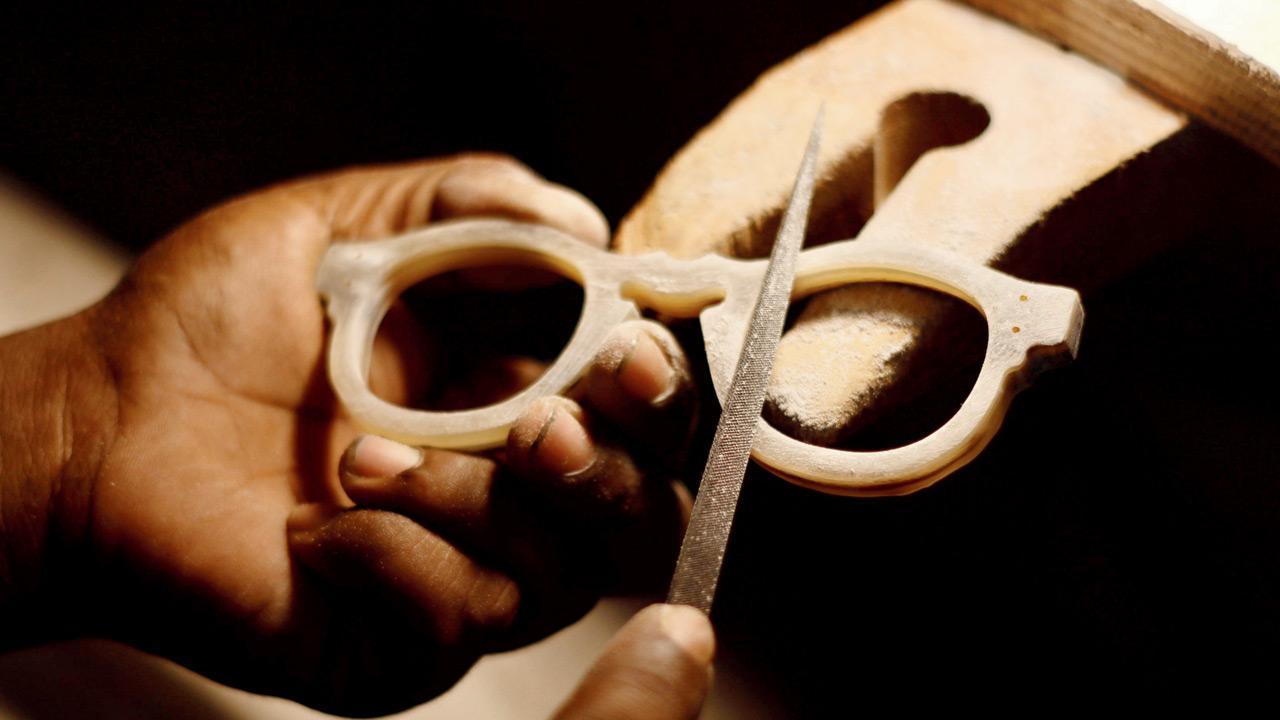Coco Leni uses ethically-sourced materials like bull horn, wood and bamboo to create the bespoke eyewear

The buffalo horn is collected only after the completion of the animal’s life cycle
Curated by Sucheta Chakraborty, Kasturi Gadge and Anju Maskeri
While in East Germany on an eyewear project as a code and e-commerce expert, Arjun Sagar was amazed at German craftsmanship and the longevity of the products. “I was working alongside consultant Matthias Hasse, when I learnt that the pair of glasses he was wearing had lasted him 20-odd years, and it was made by a local company.” Coco Leni, which he launched with Hasse, uses ethically-sourced materials like bull horn, wood and bamboo to create the bespoke eyewear.
Coco Leni also offers customisation on the glasses
“It [Coco Leni] isn’t a startup. It is the rebirth of a German brand that wasn’t reaching enough people. I felt the need for it in the larger international market, so I brought it to India and plan to take it to other countries as well.” Their buffalo horn eyewear and bio acetate frame, he claims, is created using ethically sourced and sustainable material. “The horn is collected only after the completion of the animal’s life cycle. Any waste in the frame-making process is returned to the earth for use as fertiliser.” He has introduced ‘made to order’ to offer personalisation of the sunglasses.
Arjun Sagar
“Eyewear is more than just a pair of glasses; it is also a way to express your personality and highlight face structure. So, we work with our customers to create glasses that fit. We have taken a hands-on approach and designed our own software, which generates a 3D model from a 2D drawing, for viewing, adding colour and sizing. Taking measurements is an integral feature of the design software and enables us to produce personalised glasses.” Coco Leni’s glasses are priced between Rs 7,500 and Rs 15,000.
cocoleni.in
Learn about sustainable businesses
Iyer recording an episode of Mindful Businesses
If you are a startup looking to know about your peers and how they overcame initial hiccups or a consumer looking for environmentally-conscious products, Vidhya Ramaswamy Iyer’s Mindful Businesses podcast might just be the right listen for you. “We seek out innovators in the business sector who have brought new green technologies to the market and find out their challenges, struggles and pathways to success. The stories are informative for business owners and revealing to consumers seeking green products,” says Iyer.
Vidhya Ramaswamy Iyer
In each episode, she sets the stage with background information about the industry that the organisation operates in, and then delves into the motivations and journeys of the founders. Started in July 2019, the podcast is in its eighth season with over 71 episodes. Iyer spends her time between Philadelphia, West Lafayette and Mumbai, and her podcast features businesses based in all these cities. From Mumbai, she has had Tania and Sujatha Biswas, founders of Suta, and Anamika Sengupta and Biplap Dutta, founders of Almitra Sustainables, talk about their businesses.
“We look for authenticity, genuineness and passion in the founders, and for a business that employs sustainable social, environmental and economic practices,” shares Iyer who wants her listeners to pick up at least a few new practices around sustainability from each episode. “Our guests reach out to us or are recommended to us by our listeners. We do extensive research about the environment they operate in and the mindful solutions they offer.”
Mindful Businesses on Apple Podcasts, Gaana and Spotify
An ode to Japanese art and history
Messenger with a Letter, from the series Elegant Five-Needled Pine by artist Kitagawa Utamaro. Pic Courtesy/Saint Louis Art Museum
Art from Japan, an Instagram page started in late 2017 by Copenhagen-based Christian Petersen, showcases the most stunning collection of Japanese paintings and prints, with details of the artists, material, period and the current home of the artwork. For its curator, a Philosophy graduate from the University of Copenhagen, who has long been fascinated with Japanese history and culture, the page began as a personal project.
Tracing the beginnings of this absorption, he shares, “For me, as for so many others, the real entry-point into the world of Japanese art was ukiyo-e woodblock prints, which I found very striking and evocative in their ability to bring Edo period Japan back to life,” alluding to the period in Japanese history when art and popular culture flourished significantly. Kitagawa Utamaro (1753-1806), known for his bijin ōkubi-e or “large-headed pictures of beautiful women”, he shares, is his favourite among the great Edo ukiyo-e artists for his unique style and sensitive portraits.
Christian Petersen
The page archives striking works by artists such as Shinsui Ito, one of the great figures of the early-20th century shin-hanga art movement which revitalised traditional art after it began to decline with the advent of photography in the early 20th century; Tosa Mitsuoki of the Tosa school, devoted to yamato-e, a classical Japanese style of painting; and Soga Shōhaku of the Edo period who distinguished himself by using an earlier style of brushstroke and painting mostly monochromes.
For Petersen, among the things he admires most about Japanese art is its closeness to nature and attention to the seasonal rhythm of flowers trees and landscapes. He hopes to show contemporary artworks from living Japanese artists too.
@artfromjapan, Instagram
 Subscribe today by clicking the link and stay updated with the latest news!" Click here!
Subscribe today by clicking the link and stay updated with the latest news!" Click here!









